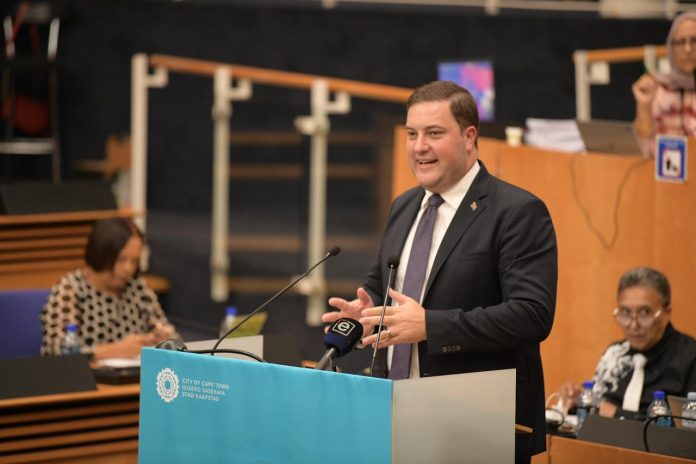Cape Town’s proposed ‘Invested in Hope’ Budget for 2025/26 prioritizes major tariff reforms aimed at providing financial relief to lower-income households, including a significantly reduced 2% electricity price increase compared to Eskom’s nationwide 11.32% hike.
Mayor Geordin Hill-Lewis announced the budget’s key provisions on Thursday, emphasizing its role in shielding residents from rising costs while continuing record investments in infrastructure and safety.
Tariff Reforms to Ease Financial Burdens
“Limiting Eskom’s 11.32% national increase to just 2% in Cape Town is made possible by our comprehensive review of the electricity tariff structure,” Hill-Lewis explained.
“For the past three decades, around 10% of the cost of each electricity unit you bought helped to fund other City services, such as area cleaning. This system will be discontinued given that Eskom electricity now costs 400% more than it did in 2004.”
Cape Town will also continue to protect Lifeline electricity customers.
“In 2023, Cape Town took the unique step among metros to raise the number of units that Lifeliners can buy at a cheaper, subsidised rate: from 350 to 600 units per month. Thanks to these changes, Lifeline customers using 600 units in a month will still pay relatively the same in 25/26 as they did three years ago,” the mayor added.
Water and sanitation fixed charges will now be based on property value rather than connection size, ensuring cost reductions for lower-income households.
“In the past, households were charged a particular fixed charge for water based on the size of their water meter connection. The problem was this: a well-off household and a low-income, non-indigent household who had the same connection size paid the same fixed charge. Now, this fixed charge will be determined by property value, resulting in a saving for the lower-income household.”
Unprecedented Infrastructure Investment
Beyond tariff reforms, Cape Town is set to make a record-breaking infrastructure investment of R39.7 billion over the next three years.
“This budget contains Cape Town’s planned infrastructure investment over three years which – at R39.7 billion – is more than the three Gauteng metros combined, and will create over 130,000 construction-related jobs,” Hill-Lewis said. “Crucially, a full 75% of this investment directly benefits lower-income households.”
The investment will allocate over R16.5 billion to water and sanitation, R5 billion to electricity grid upgrades, R3.4 billion to roads, and R4.5 billion for the MyCiti bus route expansion linking Khayelitsha, Mitchells Plain, Wynberg, and Claremont.
Expanding Safety and Security
As part of the City’s record R6.7 billion Safety and Security budget, Cape Town will deploy over 700 new municipal police officers across all wards.
“These 700 new officers are over and above the 400 new officers we’ve added to the ranks of law enforcement and metro police since the start of this term,” Hill-Lewis stated.
“We are going to post officers in neighbourhoods where they will be stationed permanently, and where they will get to know that community well. They will get to know the neighbourhood challenges, the problem buildings, and the residents themselves. This kind of personal policing, where relationships and trust are built, can only lead to more positive outcomes.”
Cape Town’s Property Rates Remain Lowest Among Metros
Despite a 7.96% increase in property rates, Cape Town’s rates will remain the lowest among all South African metros, according to the City’s ‘rate-in-the-rand’ calculation.
“Even with next year’s increase of 7.96% applied, Cape Town’s property rates remain below current 2024 levels in all other cities,” Hill-Lewis noted. “This increase is slightly above forecasted inflation, but will help the City of Cape Town make record investments to position the metro as the ‘City of Hope for all’ in line with our long-term strategic vision.”
The proposed budget also includes a 7.36% increase in refuse removal fees, which will help sustain waste services in both formal and informal residential areas. From July, a City-Wide Cleaning Tariff will also be separately reflected on bills.
Residents have until 2 May to submit their comments on the budget. A household bill calculator is available on the City’s website at www.capetown.gov.za.


